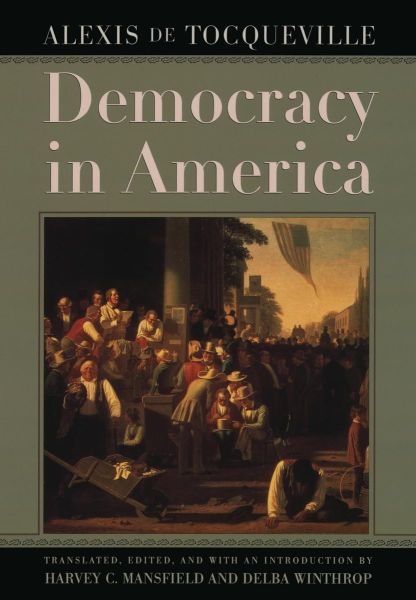Alexis de Tocqueville quotes
Alexis de Tocqueville toured the United States for nine months in 1831. He returned to France at the beginning of 1832 and set about writing up his impressions of the tour. He published his book Democracy in America in two volumes, the first in 1835, the second in 1840. I remember reading it, at the advice of a high-school friend years ago. I found the 700-page book hard-going and don't remember when I gave it up. It made a huge impression on me, at any rate, and I knew I would have to return to it, just to complete my education, so to speak.
Wikipedia has published a five-page English-language article about the book. Two aspects of the article impressed me: the use of the word "equality" as a major theme in de Tocqueville's work, and the lack of actual quoted text from his book, perhaps because the text does not support Wikipedia's commentary on it. In one example, Wkipedia writes, "The aristocracy, Tocqueville believed, was gradually disappearing, as the modern world experienced the beneficial effects of equality."
I don't personally remember Democracy in America focusing much on equality. It focuses more on American political institutions and the citizen's relationship to the government. I also remember the book as very quotable. I prefer quotes from it—even in paragraph-sized portions—to commentary about it. In other words, the text hardly justifies any commentary.
The German-language Wikipedia article is twice as long as the English: "Democracy in America is primarily an analysis of America's republican representative Democracy, as the Americans practice it. . . . Americans educate younger generations of citizens in American 'mœurs', or their traditions: accepting responsibility for themselves; personal initiative; orderliness; presence of mind; mindful of public responsibilities; and knowledgeable of democratic practices." (translation mine)
The German Wikipedia quotes something very important from the book: "The American practice of law (i.e. the Constitution?) contributes more to maintain the American Republic than anything else, except for the influence of the 'mœurs', which carry more weight than even the U.S. Constitution." (translation mine)
Again, Alexis de Tocqueville's intelligent, well-written book needs little commentary. I must admit that I find his conclusions less sanguine than I would like. Find below a few quotes that should set the record straight about the intention of Democracy in America.
From Democracy in America:
- I do not know if the people of the United States would vote for superior men if they ran for office, but there can be no doubt that such men do not run. (This one surprised me!)
- What good does it do me if an ever-watchful authority keeps an eye out to ensure that my pleasures will be tranquil? . . . Even as it removes the smallest thorns from my path, it is also absolute master of my liberty and my life. . . . When it languishes, everything around it must also languish.
- There are nations in Europe whose inhabitants think of themselves as colonists. . . . that they belong to a powerful stranger called "the Government". . . . Yet, as utterly as they sacrifice their own free will, they are no fonder of obedience than anyone else. They submit, it is true, to the whims of a clerk, but no sooner is force removed, they are glad to defy the law as a defeated enemy. Thus one finds them ever wavering between servitude and disorder.
- Slavery . . . dishonors labor. It introduces idleness into society, and with idleness, ignorance, and pride, luxury and distress. It enervates the powers of the mind and benumbs the activity of man. (De Tocqueville visited America in 1831 and surely must have seen Black-slavery close up.)
- The supreme power takes each member of the community in its powerful grasp and fashions him at will. It covers the surface of society with a network of small complicated rules, minute and uniform, that subdues the most original mind and most energetic personality, so that he cannot rise above the crowd. His will is not shattered but softened, bent, and guided.
- The American struggles against the obstacles which nature opposes to him; the adversaries of the Russian are men. America combats the wilderness and savage life; Russians fight against civilization with all its arms. The conquest of the American are thus gained with ploughshares; the conquests of the Russian are with the sword.

